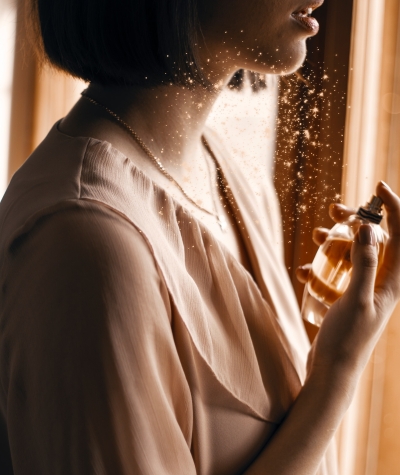In this section:
- Can the fragrances used in cosmetics cause allergic reactions?
- Fragrance-free cosmetic products
- What should I do if I suffer a reaction to a fragrance?
- Where can I find out more?
Can the fragrances used in cosmetics cause allergic reactions?
Reactions to fragrance ingredients are actually very rare; however they do sometimes occur so it is worth knowing how to avoid them. Checking the labelling on your cosmetic products is key, especially if you have a history of skin reactions. Determining the cause of a reaction and whether it is a true allergy or the much more likely irritation is a job for a specialist.
Fragrance ingredients are tested very carefully to assess how likely they are to cause skin reactions. All cosmetics that contain any fragrances will have the word 'parfum' on the ingredients list. However, those ingredients that are considered more likely to cause reactions in susceptible people are carefully monitored and if they are present above a certain level in any product, then they will be declared separately in the list of ingredients, in addition to the word 'parfum'.
This way of labelling cosmetics was introduced in 2005 to help people to make informed choices about what they buy, particularly if they have a diagnosed allergy to a specific fragrance ingredient. Such labelling will also support dermatologists trying to identify the cause of a patient's reaction.
Fragrance-free cosmetic products
Some people may look for 'fragrance-free', 'unscented' or 'unperfumed' cosmetic products for a number of reasons. They may want to avoid fragrance altogether or they may just be trying to ensure that a skin cream or antiperspirant will not clash with their preferred eau de toilette or perfume.
If someone buys a fragranced product, he or she can reasonably expect that fragrance to be noticeable after the product has been used. In contrast, they should not be able to notice any smell after using a fragrance-free, unscented or unperfumed product. However, unscented or unperfumed products may well contain a small amount of fragrance to cover-up, or mask, the natural smell of the ingredients in the product.
If you want to avoid fragrance altogether, you must look at the ingredients list, which is usually on the outer packaging or close by at the point of sale. Any added fragrance is always identified by the word 'parfum' in the ingredients list. You must also avoid any essential oils because, as well as having a strong smell, they often have the same natural constituents that are used in fragrances.
What should I do if I suffer from a reaction to a fragrance?
Reactions to fragrance ingredients are usually uncomfortable but short-term and won't pose any long-term health problems. To avoid the problem in future, it is best to consult your doctor who can refer you to a dermatologist for patch-testing, if appropriate.
After the patch test, your dermatologist or doctor will be able to determine whether your reaction is a true allergy and to supply you with a list of substances to which you are allergic or sensitised. By checking the ingredients on the product label, you will be able to decide which products to avoid in the future.
Where can I find out more?
Protecting the health and safety of the public, as well as the environment, is central to the work of the British Fragrance Association. All fragranced products are safety tested, both in their finished form and as individual ingredients, to ensure they're absolutely safe to use and enjoy. Find out more about how the safety of fragrances is determined.
See also 'How do perfumes work?'.
For more information on dermatologists, visit the British Association of Dermatologists.
For more information on allergic and irritant reactions see the allergies section.
If you want to find out about different types of ingredients in your products, visit the A-Z of terms and ingredients


